George Woodwell Tribute
Air Date: Week of January 3, 2025

Dr. George Woodwell fought to integrate scientific knowledge into public policy for over sixty years and served as a climate advisor in the Carter White House. He also played an influential role in drafting the UN Convention Framework on Climate Change Kyoto Protocol, and helped found the Environmental Defense Fund, and the Natural Resources Defense Fund. George Woodwell also founded the Woods Hole Research Center, renamed upon his retirement as the Woodwell Climate Research Center. He passed away in June 2024 at the age of 95. (Photo: Daniel Webb)
In 2024 the world lost a giant of climate science and eco activism, George Woodwell. Host Steve Curwood remembers this man who advised President Jimmy Carter on climate, helped start major environmental organizations and helped inspire the Living on Earth broadcasts. We return to moments from a conversation Steve Curwood and George Woodwell recorded for the program in 2016 and hear reflections from colleagues who knew him well.
Transcript
CURWOOD: It’s Living on Earth. I’m Steve Curwood. Few scientists have had as stellar a record in environmental science or policy activism as George Woodwell, who died in June of 2024 at the age of 95. His life’s endeavor was to understand the systems on planet Earth that support life and act to protect them. He is perhaps most famous for his climate work, but when George Woodwell won the $200,000 Volvo Environmental prize in 2001, the citation mentioned that in the1960’s he was among the first to investigate the health effects of radioactivity. That was followed by groundbreaking research that ultimately supported America's ban on DDT. This unassuming biologist was part of a team who documented climate change for President Jimmy Carter in the 1970’s. And George Woodwell was keen to bring science into public policy and action. He helped found the Environmental Defense Fund, the Natural Resources Defense Council, and the World Resources Institute. He also founded the Woods Hole Research Center which is now known as the Woodwell Climate Research Center. Under his leadership, that Center began its program of documenting how forests affect global climate and delivered seminal work that led to the UN Framework Convention on Climate Change. And on a personal note, back in 1989, he encouraged me to start the Living on Earth broadcasts. In the summer of 2016, I sat down with George Woodwell shortly after he published his sixth book, A World To Live In. He told me that title reflects what he sees as the challenge for our times.
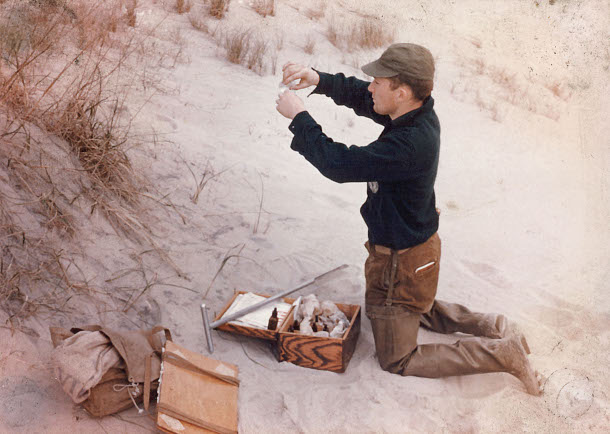
George performs graduate research in North Carolina, circa 1950s. He received a masters and PhD degree in botany from Duke University, completing his studies in 1958. He received his bachelor’s degree in biology from Dartmouth College in 1950. (Photo: Courtesy of Woodwell Climate Research Center)
WOODWELL: Well, the world is literally falling apart. We have reached a point where the opportunities for experimentation with politics and with economics, the two big systems that we admire and use and have developed to a high degree are limited -- they are limited by the biophysical limits of the earth and that topic -- the biophysics of the earth, is a topic that I have pursued for my whole career and it’s perfectly conspicuous where those limits are becoming important. DDT is a persistent pesticide. It was hailed as the ultimate pesticide in the postwar years when it was first released for general use. We showed in Long Island that the food web there was contaminated from the water of the marshes right on through the life of the marshes, clams, birds, and every trophic level existing at that time in the middle 1960s, had a burden of DDT residues coming from the aerial spraying of salt marshes to control the salt marsh mosquitoes within a factor of 10 of the acute lethal level for that organism. That sounds as though it's safe enough but the concentration up that food web was enormous. The concentration factors ran up to a hundred thousand fold. As a result of that we did get a court order which in the end resulted in the abandonment of DDT for use in spraying the salt marshes, and ultimately it led to the development of Environmental Defense Fund and the abandonment of DDT for general use in United States which was a wise thing.
CURWOOD: Your book paints corporations and industry interests as bearing the brunt of blame for environmental havoc through the decades. What kinds of events have shaped this perspective?
WOODWELL: Well, industries feel as though, in fact say commonly, that their purpose is financial profit at whatever cost. and they've made the assumption that cost can legitimately be pushed into the public realm. I look at this these days in a world of 7 billion people, pushing all the biophysical limits of the earth, and say, “Well, let's look at industries and ask just what their purpose is.” There is no industry that doesn't claim that it's doing something that's useful to the public in general, that they are selling a useful good of some sort, and in the process they're making a profit, but the profits get put first. Fiduciary responsibilities get talked about as being preeminent. Well, that’s ridiculous. It's absolutely not possible to have a tight world of seven billion or more people who are growing into demands, further demands, on resources all the time by developing technologies that make it possible to exploit bigger pieces of the resources available, all of those competing with one another, and turn these industries loose to do that.
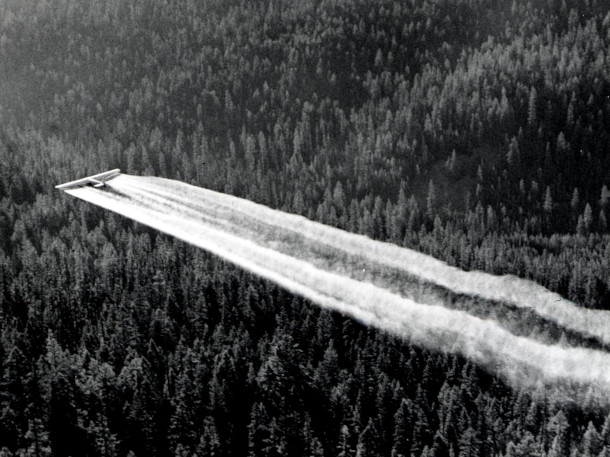
Ford tri-motor sprays DDT pesticide in July 1955. Dr. Woodwell was among the first scientists to warn of the harmful effects of DDT on wildlife. (Photo: USDA Forest Service, Pacific Northwest Region, State and Private Forestry, Forest Health Protection, Wikimedia Commons)
CURWOOD: So, you discuss in your book what the various presidencies throughout the years have meant for the climate. So which presidents have been the best in your view? Which have been the worst when it comes to climate change policy?
WOODWELL: Oh, my. Well, (CHUCKLES) Clinton had the greatest opportunities. Actually, Carter was the very best. He understood the problem. He did things about it. He put solar panels on the roof of White House, and he developed the Solar Energy Research Institute, and he was very astute and intellectually engaged. And if he had continued, if he had not been displaced by a conservative president, Mr. Reagan, who abhored anything to do with science and with the climatic disruption, we would have been 30 years ahead of where we are now.
CURWOOD: And in your view, the worst president in terms of climate? Perhaps you’re suggesting President Reagan, then.
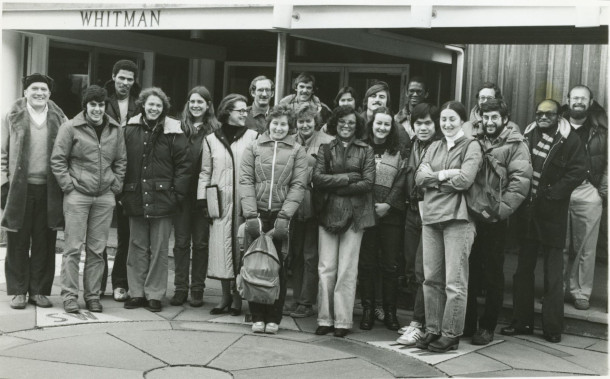
Dr. Woodwell started the Ecosystems Center in 1975 at the Woods Hole Marine Biological Laboratory. George (far left) stands with students from the January course on ecology at the Center, circa 1979-1982. (Photo: Courtesy of Woodwell Climate Research Center)
WOODWELL: (CHUCKLES) Well, the transition that Reagan made, of course, was important, but the presidents who followed him had to go out of their way to do anything really constructive. And, when Al Gore was asked to take a vigorous stand on the climate issue while he was in office, he said, “Hmmm, you want me to commit political suicide?” Things had degenerated to that point.
CURWOOODL: As part of our lookback at the extraordinary career of the late ecological scientist and activist George Woodwell, we are replaying an interview with him recorded back in the summer of 2016 when he released his book, A World to Live in. It was the middle of the presidential campaign, so I turned the discussion to the major party candidates.
CURWOOD: So, let's talk about today. What do you think a Trump presidency would mean for the climate?
WOODWELL: That's a fairly simple question. I don't think Mr. Trump has the slightest idea as to how environment limits economic and political aspirations or human aspirations, and I just don't really care to speculate as to just how bad he would be.
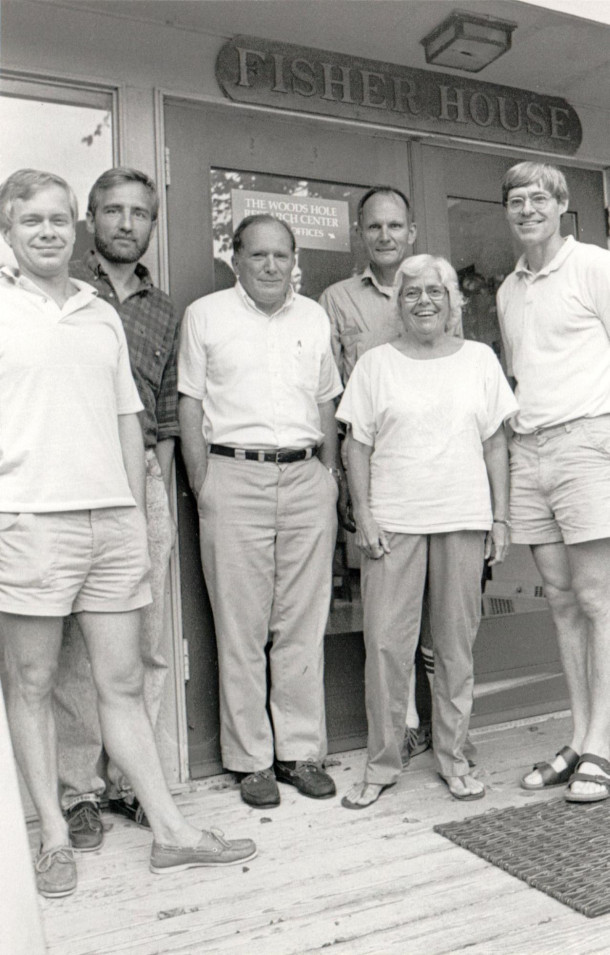
(Left to right) Tom Stone, Foster Brown, George Woodwell, Walter Matherly, Katharine Woodwell, Skee (Richard) Houghton at the Woods Hole Research Center (now the Woodwell Climate Research Center) in the late 1980s. Dr. Woodwell founded the Center in 1985. (Photo: Courtesy of the Woodwell Climate Research Center)
CURWOOD: And, in your view, what would happen if Hillary Clinton makes it to the White House?
WOODWELL: Hillary is very well-informed on virtually every topic. My guess is that Hilary will rise to the challenge. She'll be under enormous pressure from elements of the scientific community that are well-seated in the conservation law groups. The scientific community should be up in arms against the present attitude, that we can double the warming of the earth that we've experienced so far and do it safely by going to two degrees change instead of one degree change in the mean temperature of the earth as a whole.
CURWOOD: On page 100 of your book, George, you say that no threat has been great enough for the nations of the world to come together on climate change. How does the Paris climate agreement measure up to that challenge, in your opinion?
WOODWELL: Well, I think the Paris climate agreement is a political and economic compromise. I think the scientific community should not have accepted that and should be up in arms at the moment, saying, “It cannot work. It will not work. It cannot work, and it cannot be allowed.” The only course at the moment is to make the transition from fossil fuels to renewable energy sources, a perfectly attractive and possible and financially attractive, lucrative transition. It's not a dream, but it is a dream world. It’s a world that everyone would like to live in, and it's a clean world in which human rights are protected, the common property resources of air, water, and land are cherished and defended, and industries have a purpose, a primary purpose, which is the quality of the public realm.
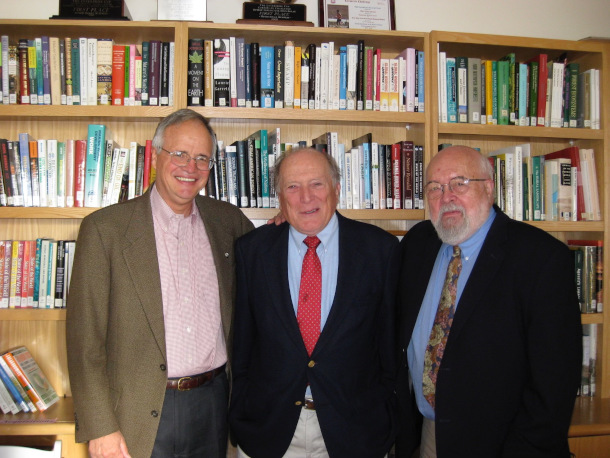
(Left to right) Gus Speth, George Woodwell, and Dean Abrahmson celebrate George’s 80th birthday in Woods Hole. (Photo: Courtesy of Gus Speth)
CURWOOD: George Woodwell, of all the things you've worked on over the past years, what do you feel was the most important? Where do you feel you really made the biggest difference?
WOODWELL: Well, I'm not sure I've made any difference, but I've been very fortunate to work on a series of topics which have turned out to be great issues of environment. So, to the extent that the public realizes that they are great issues and that correcting them, turning them to human advantage requires fundamental changes in how we manage the world, and the responsibility for that is a core purpose of Government. Governments forget. In their enthusiasm for developing economic goods they forget that they have a fundamental responsibility to protect ecological integrity, and to the extent that the public realizes that I think we've made a contribution. I'm not sure that the intensity with which the public can realize that is going to be great enough to correct the trends at the moment, which an ecologist sees as thoroughly threatening.
[MUSIC: Utah Wind Symphony, "Triumphant Journey for Horn and Wind Symphony,” comp. Rick DeJonge, YouTube rehearsal performance from 2018: https://www.youtube.com/watch?v=SqyBSRv99ao]
CURWOOD: By the time of his death in 2024 at the age of 95, George Woodwell had inspired many people who became leaders in their own right. And in a montage we will hear some now, starting with Kiliparti Ramakrishna, an international lawyer who helped craft the UN Framework Convention on Climate Change. Also John Holdren, a Harvard and UC Berkely professor who served in the White House as Barack Obama’s science advisor, And Gus Speth who worked with George in the Carter White House and with him established the World Resources Institute. And Richard “Skee” Houghton, who started as a close research associate with George Woodwell sixty years ago and never left.
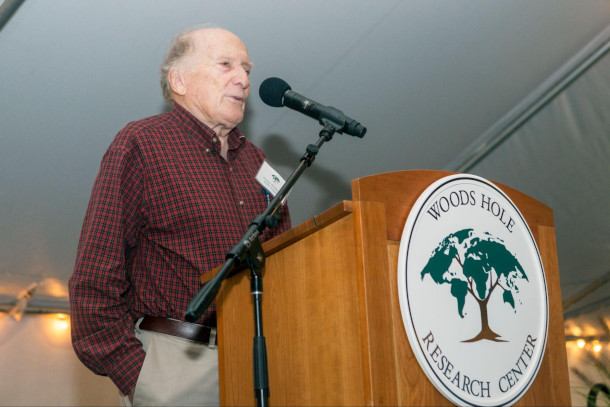
Dr. Woodwell speaks at the Woods Hole Research Center in 2018. (Photo: Courtesy of the Woodwell Climate Research Center)
RAMAKRISHNA: I considered him the ideal definition of a science diplomat.
HOLDREN: George was a brilliant scientist, first of all, but being a brilliant scientist was never enough for him. He wanted to be sure that the science he was doing and others were doing in related domains, got into the policy process, led to improvements in public decisions, and therefore led to a better world.
RAMAKRISHNA: Another thing that he was very fond of saying is that the role of the government is to define and defend public interest. And the question, of course, is how do you come to the conclusion and what's in public interest? And that is where he said, Well, you have to rely on science. And so that's where I think George stands out amongst all of his great luminary scientists colleagues that he has.
SPETH: You know, at that time, it was hard to be an outspoken scientist, this is, this is worth noting, because the scientists, you know, had their role in society as they perceived it. And it wasn't really to speak out on policy issues, it was just to make the science available. And there was no real serious effort to not only educate the public, but to draw out the policy implications. And over time that has changed in the scientific community has changed. And I give George a lot of credit for that, because he was a pioneer in making science policy relevant.
HOUGHTON: He liked to not just hand down orders, but he would have discussions with anybody involved. Even if he had thought about it, and he thought he knew the way to go, he liked to bring everyone on board, and he was not averse to changing his mind if he heard arguments to the contrary. He certainly had a mission. He had things he wanted to do. But he would, he would always have time to talk to you. He was authentically interested in you when he was having a conversation, and he could talk about anything.
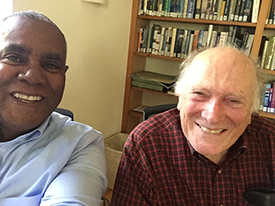
Living on Earth’s Executive Producer Steve Curwood interviewed George Woodwell at the Woods Hole Research Center (now the Woodwell Climate Research Center) in 2016. (Photo: Steve Curwood)
SPETH: We were devoted to George. I was devoted to George. He was steady as a rock. He was clear eyed and clear headed. He had a really good sense of humor, which made him a delightful companion. He laughed a lot, had a very positive spirit. He was always encouraging us young guys, when we were about 15 years younger, so George was almost a father figure.
RAMAKRISHNA: When the heat went out in my house, he came with his tools and then fixed it before I could call anybody else for help, and you know, this was a winter evening, but he's the one coming to my basement and then fixing the heating system, I mean, you know, where do you find somebody like that?
HOLDREN: We've all met people who were very smart, who were good scientists, who were collegial, who were warm hearted, who were optimistic, who were engaged in influencing the policy process in a very determined and effective way. But to have all that combined in one person made George Woodwell really exceptional.
CURWOOD: George Woodwell is gone now, but not forgotten, and as our planet wrestles with the climate emergency, his work will likely loom large in the annals of history. And we, and I include you, the listeners to Living on Earth, owe him a debt of gratitude for his clarity and his convictions. Thanks, George Woodwell, for your efforts to help make this a world to live in.
Links
Listen to our 2023 interview with George Woodwell: A Call to Cool the Earth
Listen to our 2016 interview with George Woodwell about his book A World to Live In
Living on Earth wants to hear from you!
Living on Earth
62 Calef Highway, Suite 212
Lee, NH 03861
Telephone: 617-287-4121
E-mail: comments@loe.org
Newsletter [Click here]
Donate to Living on Earth!
Living on Earth is an independent media program and relies entirely on contributions from listeners and institutions supporting public service. Please donate now to preserve an independent environmental voice.
NewsletterLiving on Earth offers a weekly delivery of the show's rundown to your mailbox. Sign up for our newsletter today!
 Sailors For The Sea: Be the change you want to sea.
Sailors For The Sea: Be the change you want to sea.
 The Grantham Foundation for the Protection of the Environment: Committed to protecting and improving the health of the global environment.
The Grantham Foundation for the Protection of the Environment: Committed to protecting and improving the health of the global environment.
 Contribute to Living on Earth and receive, as our gift to you, an archival print of one of Mark Seth Lender's extraordinary wildlife photographs. Follow the link to see Mark's current collection of photographs.
Contribute to Living on Earth and receive, as our gift to you, an archival print of one of Mark Seth Lender's extraordinary wildlife photographs. Follow the link to see Mark's current collection of photographs.
 Buy a signed copy of Mark Seth Lender's book Smeagull the Seagull & support Living on Earth
Buy a signed copy of Mark Seth Lender's book Smeagull the Seagull & support Living on Earth

